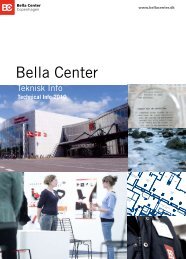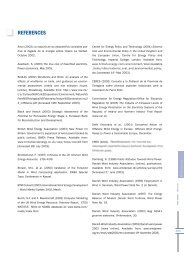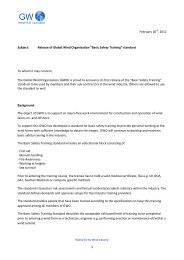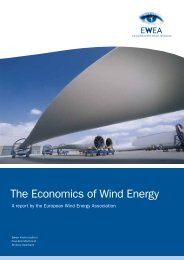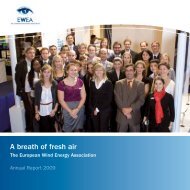Offshore Electricity Infrastructure in Europe - European Wind Energy ...
Offshore Electricity Infrastructure in Europe - European Wind Energy ...
Offshore Electricity Infrastructure in Europe - European Wind Energy ...
Create successful ePaper yourself
Turn your PDF publications into a flip-book with our unique Google optimized e-Paper software.
Towards an <strong>Offshore</strong> Grid – Further considerations<br />
and DE) under the <strong>in</strong>itiative of the Belgian M<strong>in</strong>ister<br />
of <strong>Energy</strong>, has evolved <strong>in</strong>to a political <strong>in</strong>itiative with<br />
all ten countries around the North and Irish Sea (BE,<br />
FR, NL, LU, DE, UK, IR, DK, SE and NO). The North<br />
Seas Countries’ <strong>Offshore</strong> Grid Initiative (NSCOGI)<br />
aims at coord<strong>in</strong>at<strong>in</strong>g, on a multilateral level, offshore<br />
w<strong>in</strong>d and <strong>in</strong>frastructure developments <strong>in</strong> the North<br />
Sea. It is more specifically targeted at achiev<strong>in</strong>g a<br />
common political and regulatory basis on offshore <strong>in</strong>frastructure<br />
development with<strong>in</strong> the region. A common<br />
Memorandum of Understand<strong>in</strong>g between all parties<br />
has been signed at the end of 2010 [39]. Much is<br />
expected from this <strong>in</strong>itiative for the facilitation of real<br />
developments. In this framework, TSOs will carry<br />
out a cost-benefit analysis by December 2012. The<br />
<strong>Offshore</strong>Grid consortium is <strong>in</strong> regular contact with<br />
Work<strong>in</strong>g Group 1 of the NSCOGI on Grid Configuration.<br />
The prelim<strong>in</strong>ary outcomes have been presented to this<br />
work<strong>in</strong>g group, and a session on the f<strong>in</strong>al results will<br />
be held <strong>in</strong> October 2011.<br />
Industry level<br />
As imposed by law under the Third Legislative<br />
Package on <strong>Europe</strong>an <strong>Electricity</strong> and Gas Markets<br />
[40], <strong>Europe</strong>an Transmission Grid Operators (TSOs)<br />
for electricity have united under ENTSO-E [41]. This<br />
organisation improves cooperation across national<br />
borders, and is thus crucial for the development of<br />
offshore electricity grids. With<strong>in</strong> ENTSO-E, two work<strong>in</strong>g<br />
groups are relevant <strong>in</strong> this respect:<br />
• Regional Work<strong>in</strong>g Group North Sea under the<br />
System Development Committee,<br />
• WG 2050/Supergrid under the System Development<br />
Committee.<br />
The regulators cooperate voluntarily via the Council of<br />
<strong>Europe</strong>an <strong>Energy</strong> Regulators (CEER). A key objective of<br />
the CEER is to facilitate the creation of a s<strong>in</strong>gle, competitive,<br />
efficient and susta<strong>in</strong>able EU <strong>in</strong>ternal energy<br />
market that works <strong>in</strong> the public <strong>in</strong>terest. The <strong>Europe</strong>an<br />
Regulators’ Group for <strong>Electricity</strong> and Gas (ERGEG) was<br />
set up by the <strong>Europe</strong>an Commission <strong>in</strong> 2003 as its advisory<br />
body on <strong>in</strong>ternal energy market issues. ERGEG<br />
launched 7 <strong>Electricity</strong> Regional Initiatives (ERI, [9]),<br />
with the aim to speed up the <strong>in</strong>tegration of <strong>Europe</strong>’s<br />
national electricity markets. Under the <strong>Europe</strong>an<br />
Commission’s Third Package [40], all <strong>Europe</strong>an regulators<br />
are now united <strong>in</strong> the Agency for the Cooperation<br />
of <strong>Energy</strong> Regulators (ACER, dissolv<strong>in</strong>g ERGEG). ACER<br />
was created <strong>in</strong> 2010, as imposed by the 3rd package,<br />
to fill the regulatory gap on cross-border issues<br />
and should oversee the cooperation between the<br />
TSOs. Although there are various challenges to face<br />
on regulatory level (cost allocation and profit marg<strong>in</strong>s,<br />
compatibility <strong>in</strong> renewable energy support, etc.), action<br />
on offshore grid issues on the regulator’s side is<br />
currently very limited.<br />
F<strong>in</strong>ally, the <strong>in</strong>itiative ‘The Friends of the Supergrid<br />
(FOSG)’ [42] comb<strong>in</strong>es companies <strong>in</strong> sectors that will<br />
deliver the HVDC <strong>in</strong>frastructure and related technology<br />
with companies that will develop, <strong>in</strong>stall, own and<br />
operate that <strong>in</strong>frastructure. They have jo<strong>in</strong>ed because<br />
of a mutual <strong>in</strong>terest <strong>in</strong> promot<strong>in</strong>g and <strong>in</strong>fluenc<strong>in</strong>g the<br />
regulatory and policy framework that is required to enable<br />
large-scale <strong>in</strong>terconnection <strong>in</strong> <strong>Europe</strong>.<br />
88 <strong>Offshore</strong>Grid – F<strong>in</strong>al Report



